 |
Socio-Political Issues
Hillaire Belloc, the Liberal - Part IV
‘Louis XVI and the Queen Were Traitors:
They Needed to be Executed’
Patrick Odou
We have already seen how Belloc – instead of being the model Catholic historian as some pretend – defends the bloodbath of the Terror in the French Revolution and the slaughter of the Catholic peasants of the Vendée who opposed it. Now, I will address another contradiction found in his writings: In his books on the French Revolution we find that, even though he admits some abuse of authority by mobs and tyrants, Belloc condemns any attempt made by the legitimate monarchical authorities to restore order.
In fact, defeating those revolutionaries and restoring altar and throne to the rightful place they have had for more than 1,000 years in France is repeatedly referred to by him as an act of “treason.”
'I know the revolutionaries were usurpers and conspirators …'
I don’t have a problem in granting that Belloc admits, as do almost all historians, that the revolutionaries usurped their power. Here is a sample:
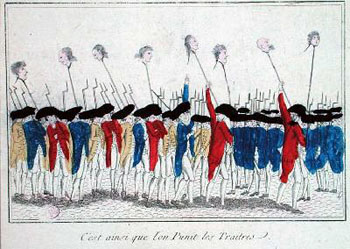
The caption reads: "This is how we punish the traitors." Belloc justifies the rabble who killed the French nobles |
“The dying Legislative had but one function to fulfil: to register the decrees of whatever was for the moment the necessary usurper, the dictator. That dictator and usurper was the Commune (Robespierre, p.197).
As soon as he admits this, however, he tries to justify that abuse:
“I know how monstrous this body appears to those who are unacquainted with the nature of France. I know that the voters who named it were called in haste, secretly, at night. I know that it sprang from a conspiracy, and out-stepped all the boundaries which the Revolution had hitherto laid down for itself. I know that by arithmetic and paper arguments one can show, if one chooses, that it was irresponsible and arbitrary; a body of men that had captured the nation.
“But I say that a man who does not understand the hegemony of Paris, and who does not understand the rapid instinctive action by which Paris determines each step in the development of the nation, is a man unfitted to deal with the history of France.” (R, p.197; see also The Last Days of the French Monarchy p.16, 49)
Thus, even though Belloc admits excesses, he considers them justifiable for those who understand the mentality of the French people of Paris…
'The King, Queen and nobility were traitors'
Once the rabble took the King and his family prisoner in the Tuileries in 1791, nothing was more normal for them to do than to seek assistance for their self-defense, as well as for the defense of France which they represented. Unfortunately, the King did not do this with sufficient cleverness and efficiency. Nevertheless, Queen Marie Antoinette entered into contact with her brother, the Emperor of Austria, and tried to convince him to help. Also, other measures were attempted through some loyal friends and secret correspondence in order to stop that mad coup d’état.
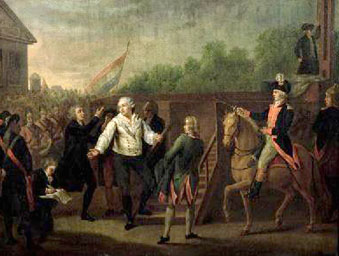
Belloc claims the King was "guilty of treason"
|
Those legitimate measures of self-defense, made in accordance with the most elementary principles of Natural Law as well as to fulfill their obligations as sovereigns of France, are seen by Belloc as blatant acts against the national welfare:
“The Palace of the Tuileries in Paris was thus a sort of fortress wherein the executive - that is, the King and the Queen at his side -… could direct operations adverse to the national welfare.” (LDFM pp.87-88)
For him, the act of seeking force of arms to stop and overthrow the chaos, injustice and bloodbath of the Revolutionaries was to betray the people and the country. Indeed, many times Belloc restates this theme:
• “To deny that he [the King] had been guilty of treason is simply to deny the right of a nation to safeguard its own defense and to deny that the executive [the King] is the servant of the national interest.” (R p. 223)
• “The King was manifestly party to a moral compact with the enemy, his chief city was already holding him answerable for treason…”(LDFM pp. 136-137)
• “It was certain that the Crown was betraying the people.” (LDFM p. 92)
• “The verdict had been given. Louis was found guilty by all of betraying the nation. He had called in the enemy.” (LDFM p. 199)
• “The [military] plans had already been drawn up for the campaign (and promptly betrayed to the enemy by the Queen).” (The French Revolution, p.117)
• “Plans of campaign were drawn up (and promptly betrayed by Marie Antoinette to the enemy)…(FR p.161)
• ”Parliament replied by measures … only to exasperate the Crown, which was betraying the nation.” (FR p.118)
Belloc acknowledges that the King had Catholic reasons for his action but maintains his accusation of treason:
“The King was alienated by the clerical laws, but nothing is an excuse for treason.” (Danton, p. 155)
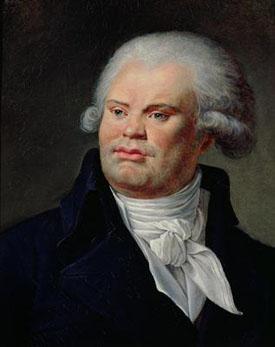
Danton is presented as a savior of the nation |
Then he goes on and presents Danton as a savior of the nation, while insisting that the King was betraying it:
Danton “fears that the King is betraying the nation. How much he was a traitor was not known till a far later period; but when at least it is proved that something is undermining the French people, that, apart from the defeats and the lack of preparation, there is treason, then he leaves his silence. …He saved France.” (D p.157)
Further in that same book Belloc tries to justify the King’s murderer:
“He [Danton] expressed himself in that speech with very great energy upon this particular feature of the trial, that the King merited condemnation because he had obviously and openly betrayed the nation - a thing which nobody doubted, which nobody denied, and which Louis himself and his advisers would simply have met by saying (at a later epoch of course), ‘We called in the foreigner as a necessary police in the time of anarchy; we desired to save France by its betrayal.’” (D. p. 336)
In this last quote we see Belloc putting words into the mouth of Louis XVI which reflect more the mentality of Belloc than the King. I believe that King Louis would have said this: “We called for assistance outside of Paris [Vendée, Brittany and others were already fighting the usurpers in France] and outside of France, as necessary in this time of anarchy, butchery, injustice, usurpation and persecution of the Church. We desired to save France. You are the traitors! You Revolutionaries are betraying the people of France!”
'The feudal classes were also traitors'
As an extension of Belloc’s passionately wrong approach on patriotism and legitimacy, all those royalists who fled France to escape death by guillotine are also referred to as traitors.
“The emigrants were (for the most part) frank traitors. There was no hypocrisy or mincing; they were willing to fight in defense of something superior to the nation - the feudal class of Europe.” (R p.159)
'The King needed to be killed'
In the mind of Belloc, a so-called Catholic historian, the Catholic King of France and its millenary Catholic Monarchy, which included in its ranks many Saints who won incomparable glory for France, that is, all that represented France’s Catholic past, had to be destroyed to protect that Masonic experiment known as the French Revolution:
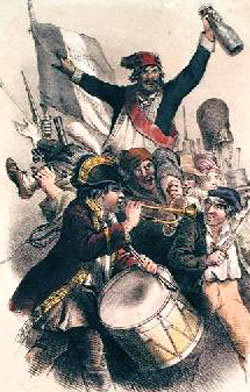
"The rise of a sort of crusading enthusiasm..." |
“So long as that centre [the French Monarchy] stood and governed, so long as it betrayed (for it was certainly betraying) the nation in arms, that nation and the great experiment upon which it had embarked were in peril or doomed.” (LDFM p.95)
The French Revolution, an explosion of pride and sensuality that produced an enormous wave of egalitarianism in institutions and liberalism in customs throughout France and Europe, was highly praised by Belloc. He described it as “a period of high political excitement” and as a “crusading enthusiasm” that spread “democratic principles throughout Europe and transformed society.”
Further, he attacks the King as creating a rallying-point for the counter-revolution. This would justify the King’s execution according to Belloc:
“Coincident with these successes, there came a period of high political excitement in Paris, and the rise of a sort of crusading enthusiasm, to spread the democratic principles throughout Europe and to transform society. It is to this more than to any other cause that we must ascribe the trial and execution of the King. There was, indeed, from the point of view of statesmanship alone, some excuse for the trial and fate of Louis. So long as he lived, he was necessarily a rallying-point round which all the counter-revolution would gather.” (LDFM p.197)
After the murder of the King and Queen, Belloc shows contempt for the royal family and ridicules those who try to defend them in history. To him, the King is a man who “committed a great crime.” Besides supporting infamous slanders on the dignity of Queen Marie Antoinette spread by the filthiest propaganda, Belloc’s accusation against those who defend the King is very strong. He states:
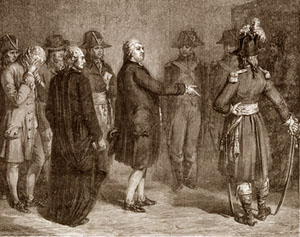
Belloc resents pictures that portray the King in a dignified way. Above, on his way to execution |
“His passion, his last will, his tearing from his family, these throughout France, and, alas, throughout Europe, became the subject of I know not how many prints, pamphlets, ballads. I have before my eyes as I write the best known of the pictures that swelled the English propaganda: in this, with the most ridiculous nobility of feature, he is seen breaking away in the awful morning of his execution from his wife (to whom is lent a very inconsistent dignity), and from his children, who are evidently made in that picture the children of all of us.
“When a man commits a great crime those who (driven by the necessities of a common religion or of politics) undertake his defense, can never resist the temptation to a gross unreasonableness. They will present his sufferings to you continually: they will take for granted with a smile or with a violent ellipsis of indignation, that no proofs of his guilt exist. They postulate innocence, refuse to plead, and harp day after day upon his punishment. So it was with Louis, but a man would be over-bitter who in these days of ours, now that the quarrel against monarchy has been so thoroughly settled, should grudge him the unreasoning consolation of loyalty that he received.
“To deny that he had been guilty of treason is simply to deny the right of a nation to safeguard its own defense, and to deny that the executive is the servant of the national interest.” (R pp.222-223)
Conclusion
I believe these quotes are sufficient to prove that this so-called “Catholic historian” is a passionate partisan of the Revolution, even in its most censurable excesses, which were the murders of the King and the Queen.
No evidence showing that the Monarchy was a benefit to France and essential in building its glorious past is accepted. No one who defends the past history of France is just. No Catholic who attacks the French Revolution as being against the Church is well-informed. Is this the appraisal of an impartial historian or is it the obsession of a fanatic? Hillaire Belloc: the fanatic liberal is the appropriate epithet that comes to mind.

Posted November 19, 2008

Related Articles of Interest:
 Belloc the Liberal I - His Support of the French Revolution Belloc the Liberal I - His Support of the French Revolution
 Belloc the Liberal II - His Enthusiasm for Rousseau Belloc the Liberal II - His Enthusiasm for Rousseau
 Belloc the Liberal III - Justifying the Terror Belloc the Liberal III - Justifying the Terror
 Pope Bows to the Ideals of the French Revolution Pope Bows to the Ideals of the French Revolution
 Unmasking the Myth of Queen Marie Antoinette Unmasking the Myth of Queen Marie Antoinette
 The State of Mind that Generated the Revolution The State of Mind that Generated the Revolution
 Revolution and Counter-Revolution: Historic Overview Revolution and Counter-Revolution: Historic Overview

|
Social-Political | Hot Topics | Home | Books | CDs | Search | Contact Us | Donate

© 2002- Tradition in Action, Inc. All Rights
Reserved
|
 |
|